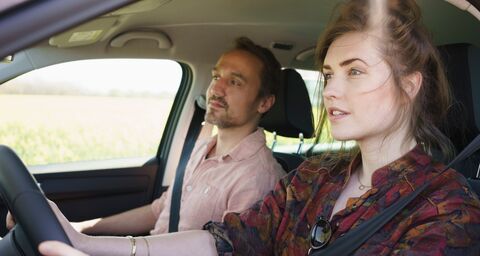
What types of insurance do I need?
My first car
Put on the brakes too late? Grazed another car when parking? A flat tire on your way to your vacation? Something can always happen in road traffic. And repair and towing costs can quickly end up being very expensive and drain the budget of young drivers.
If you own a car in Switzerland, then you have to have liability insurance by law. This insurance covers damage that you cause to other people or their property if you cause an accident. In addition to liability insurance, you can also take out partial or comprehensive accidental damage insurance to protect your vehicle against theft, accidents, or other damage.
Good to know: Young drivers benefit with our car insurance and the safe driver bonus from 15% discount and an exclusive prevention program.
What insurance do I need for my first car?
Motor vehicle liability insurance is mandatory: You’ll need to have a motor vehicle liability insurance policy in order to register your car with the local road traffic office. Without this insurance, you are not allowed to drive your car. This liability insurance protects you if you injure other people or hit animals or objects on the road while you are driving.
Partial and comprehensive accidental damage insurance are voluntary: With comprehensive or partial accidental damage insurance, damage to your car is also covered. Partial accidental damage insurance covers damage that occurs through natural events, such as hail or fire, or that arises due to animals, theft, or malicious damage. Comprehensive accidental damage insurance additionally covers damage that you cause to your vehicle yourself, for example, if you run into a sign when parking.
How does car insurance work?
What types of insurance are mandatory and which types are good to have? How is the car premium calculated? Why do young drivers generally pay higher car insurance premiums? What's the no-claims discount all about? Find out this and much more in our explanatory video. Play the movie!
Do I need traffic legal protection insurance?
Traffic legal protection insurance helps you, for example, if you run into difficulty when buying your first car. If your flight to your vacation destination is canceled. Or if you get a ticket for going to fast on an e-scooter. Do you drive a lot or rely on your driver's license for your job? Here, too, it can be a good idea to take out traffic legal protection insurance.
Your advantages with AXA

1
myAXA client portal: Manage documents, upload invoices, or change your personal data – whenever and wherever you want. Say goodbye to paperwork!

2
We are Switzerland's number one insurer: We provide excellent services, personal advice, and individual insurance protection.

3
Save on premiums: Young drivers under the age of 26 benefit with our car insurance and the safe driver bonus from 15% discount.
FAQs and tips about buying your first car
Which questions should I ask before buying a car?
Before you start looking for your first car, you should first consider what exactly it is that you need and want. Your budget plays a major role in your decision. Nevertheless, other factors such as what the car will actually be used for should also be taken into account:
- How much do I want to spend on the car?
- How often do I drive?
- How many kilometers do I drive per year?
- Do I often drive in city traffic or regularly in the countryside?
- Do I often drive in the mountains and in snow?
- How much room do I need in the interior?
- Do I have or need a parking space?
- Could my life situation change in the near future?
What should I watch out for when I buy my first car?
When buying your first car, there are a few important factors to keep in mind:
- Budget: Think about how much money you can and want to spend on buying the car. Keep in mind ongoing costs such as insurance, taxes, maintenance, and repairs.
- Vehicle type: Think about what kind of car you need. For example, do you need a big car for the family you have planned or a small car for city traffic?
- Odometer reading: Look for the odometer reading of the car since it can be an indicator of the car’s condition. A low odometer reading general means that the car has not been driven much and will have less wear and tear.
- Condition: Check the car’s condition thoroughly. Look for any possible damage, rust, or other defects. A test drive can help you better assess the condition of the car.
- Purchase agreement: Make sure that you conclude a purchase agreement that includes all the important details of the purchase, such as the purchase price, condition of the car, and any guarantees.
- Insurance: Consider in advance what type of car insurance you need and conclude it before you buy the car.
- Registration: Make sure that the car is registered correctly and you have all the necessary documents.
More information can be found in our blog article: “Buying a car – 7 mistakes to avoid”
Is there a discount for young drivers?
With AXA, you benefit from a 15% discount: Young drivers up to the age of 26 can save considerably on their premiums with AXA’s car insurance by taking part in the safe driver bonus program.
What should you do if you’ve had an accident?
Rear-ending someone, hitting a wild animal, or damaging your car while parking: No one wants to be involved in an accident, but it can happen before you know it.
If you are involved in an accident, it’s important that you know what to do and who to call. If you rear-end someone, here’s what you need to do.
If you are involved in an accident while driving: You can report it here. Or you can call us at 0800 809 809. We would be happy to help.
You can find more information in our blog: “Car accident – and what now?”
Which rules are there for young or new drivers?
Special rules apply in Switzerland for drivers under the age of 25 (young drivers) and for those over the age of 25 who have had a driver’s license for less than two years (new drivers).
Since 2005, there has been a so-called two-phase license: After passing the test, young and new drivers have a provisional license for three years.
Within the first year, they must pass the obligatory training day (WAB 2.0 course) to get their definitive license. Cautious driving is also a basic requirement. After all, if young or new drivers commit gross violations against road traffic laws during the probation period, they will lose their license.







